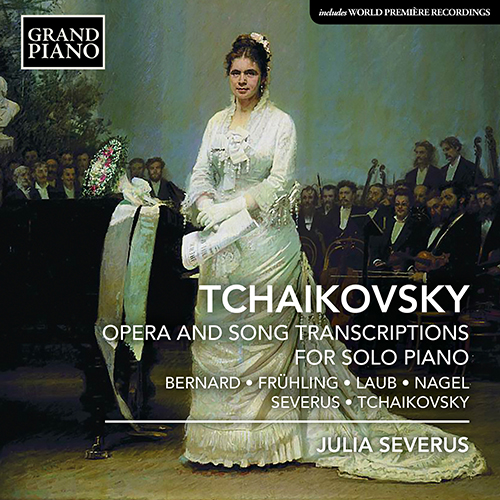
About this Release
Catalogue No.: GP795
Release Date: October 2019
Barcode: 747313979523
Composer(s): Pyotr Il'yich Tchaikovsky
Artist(s): Julia Severus
Link(s):
TCHAIKOVSKY, PYOTR IL’YICH (1840–1893)
Opera and Song Transcriptions for Solo Piano
- Julia Severus, piano
Tchaikovsky wrote over 100 lyric art songs or Romances, a sequence of diaries of the soul that embrace moods from euphoria to despair. They were unusually important to him, and he, or his editors, commissioned piano transcriptions by eminent musicians such as Laub and others, all of which were revised by Tchaikovsky. These poetic and melodically beautiful songs, many of which are here recorded for the first time, include the ravishing None but the Lonely Heart and reveal a ‘new’ body of Tchaikovsky’s piano repertoire. The album concludes with an opera fantasy on themes from Eugene Onegin by the Austrian composer and pianist Carl Frühling.
This recording was made on a modern instrument: Steinway, Model D
Tracklist
|
6 Romances, Op. 16 (version for piano) (1872) (00:11:00 )
|
|
1
No. 1. Kolïbel'naya pesnya (Cradle Song) (00:02:58)
|
|
2
No. 4. O, spoy zhe tu pesnyu (O Sing that Song) (00:02:29)
|
|
3
No. 5. Tak chto zhe? (So What, Then?) (00:02:45)
|
|
5
6 Romances, Op. 28: No. 3. Zachem? (Why?) (arr. V. Laub for piano) (1875) * (00:02:22)
|
|
6
Khotel bï v edinoye slovo (I Should Like a Single Word) (arr. J. Severus for piano) (1875) * (00:01:35)
|
|
7
6 Romances, Op. 73: No. 6. Snova, kak prezhde, odin (Again, as Before, Alone) (arr. J. Severus for piano) (1893) * (00:02:22)
|
|
8
6 Romances, Op. 73: No. 1. Mï sideli s toboy (We Sat Together) (arr. A. Bernard for piano) (1893) * (00:01:19)
|
|
9
7 Romances, Op. 47: No. 6. Den' li tsarit? (Does the Day Reign?) (arr. J. Severus for piano) (1880) * (00:03:21)
|
|
11
Fantaisie caractéristique sur des motifs de Vakoula le Forgeron de Tchaikovsky (Characteristic Fantasy on motifs of Tchaikovsky's Vakula the Smith), Op. 319 () * (00:10:17)
|
|
12
6 Romances, Op. 6: No. 3. I bol'no, i sladko (It Is Both Painful and Sweet) (arr. J. Nagel for piano) (1869) * (00:02:44)
|
|
13
6 Romances, Op. 38: No. 1. Serenada Don-Zhuana (Don Juan's Serenade) (arr. A. Bernard for piano) (1878) * (00:02:36)
|
|
14
6 Romances, Op. 27: No. 3. Ne otkhodi ot menya! (Do not Leave Me!) (arr. V. Laub for piano) (1875) * (00:02:31)
|
|
15
6 Romances, Op. 73: No. 2. Noch' (Night) (arr. H. Pachulski for piano) (1893) * (00:02:48)
|
|
6 Romances, Op. 6 (arr. J. Severus for piano) (1869) (00:06:00 )
|
|
4
6 Romances, Op. 6: No. 5. Otchevo? (Why?) (arr. J. Severus for piano) * (00:02:46)
|
|
16
6 Romances, Op. 6: No. 6. Net, tol'ko tot, kto znal (No, Only One who has Known), "None but the Lonely Heart" (arr. J. Severus for piano) * (00:02:51)
|
|
17
12 Romances, Op. 60: No. 1. Vcherashnyaya noch' (Last Night) (arr. V. Laub for piano) (1886) * (00:03:19)
|
|
6 Romances, Op. 63 (arr. A. Bernard for piano) (1887) (00:03:00 )
|
|
10
6 Romances, Op. 63: No. 5. Uzh gasli v komnatakh ogni (The Fires in the Rooms Were Already Out) (arr. A. Bernard for piano) * (00:02:38)
|
|
18
6 Romances, Op. 63: No. 2. Rastvoril ya okno (I Opened the Window) (arr. A. Bernard for piano) * (00:01:44)
|
|
19
12 Romances, Op. 60: No. 6. Nochi bezumnïye (Frenzied Nights) (arr. A. Bernard for piano) (1886) * (00:02:56)
|
|
20
12 Romances, Op. 60: No. 11. Podvig (The Heroic Deed) (arr. J. Severus for piano) (1886) * (00:03:49)
|
|
21
Fantasy on Eugene Onegin () * (00:11:47)
|
* World Première Recording
Total Time: 01:11:57
The Artist(s)
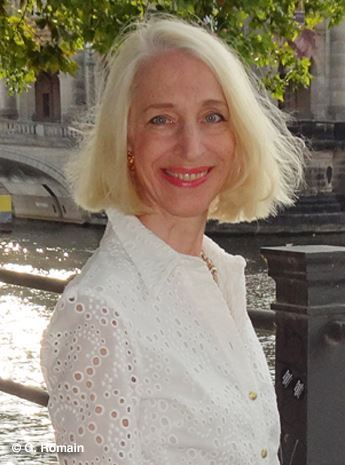 Julia Severus began playing the piano at the age of four. She graduated from the Berlin University of Arts and from the Moscow Tchaikovsky Conservatory, where she studied piano with Mikhail Voskresensky and Lev Naumov. Wishing to explore piano ensemble repertoire, she founded the Aurora Duo and Quartet, performing numerous premieres and world premieres, among them Rodion Shchedrin’s Hommage à Chopin in the presence of the composer, followed by a recording for two pianos, eight hands, of Russian Romantic Piano Transcriptions (Naxos 8.557717). Her solo recordings, including Tchaikovsky’s opera and song transcriptions (GP795), have been highly praised. Julia Severus lives and works in Paris and Berlin.
Julia Severus began playing the piano at the age of four. She graduated from the Berlin University of Arts and from the Moscow Tchaikovsky Conservatory, where she studied piano with Mikhail Voskresensky and Lev Naumov. Wishing to explore piano ensemble repertoire, she founded the Aurora Duo and Quartet, performing numerous premieres and world premieres, among them Rodion Shchedrin’s Hommage à Chopin in the presence of the composer, followed by a recording for two pianos, eight hands, of Russian Romantic Piano Transcriptions (Naxos 8.557717). Her solo recordings, including Tchaikovsky’s opera and song transcriptions (GP795), have been highly praised. Julia Severus lives and works in Paris and Berlin. The Composer(s)
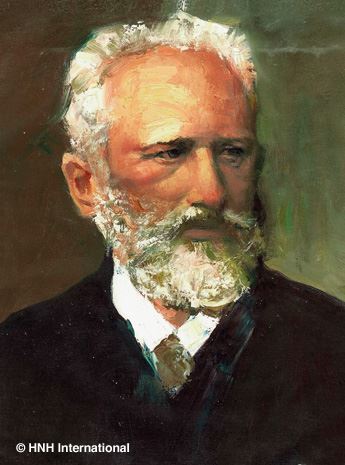 Pyotr Il’yich Tchaikovsky, born in Votkinsk, Ural in 1840, the son of a mine owner, received piano lessons from early age. After studying law, he worked in the Ministry of Justice in St Petersburg until he decided to pursue his musical interests, and in 1862 began to take lessons in composition with Anton Rubinstein, the founder of the St Petersburg Conservatory. From 1866, he lectured at the Moscow Conservatory, while at the same time writing his first successful compositions. The generous support of his patron Nadezhda von Meck allowed him to abandon teaching in 1877 and thenceforth dedicate himself fully to composing. While achieving notoriety in Russia and abroad, he became one of the most universal composers, excelling in almost all music genres, with his oeuvre spanning symphonies and symphonic poems, suites, incidental music, operas, ballets, solo concertos, chamber music, cantatas and works for piano. Fluent in Russian, French, English and German, his known correspondence comprises more than 5,000 letters. From 1887, Tchaikovsky took to conducting, and in the following years he undertook concert tours throughout Europe and America, enjoying triumphant success. He died in 1893, probably from the consequences of cholera.
Pyotr Il’yich Tchaikovsky, born in Votkinsk, Ural in 1840, the son of a mine owner, received piano lessons from early age. After studying law, he worked in the Ministry of Justice in St Petersburg until he decided to pursue his musical interests, and in 1862 began to take lessons in composition with Anton Rubinstein, the founder of the St Petersburg Conservatory. From 1866, he lectured at the Moscow Conservatory, while at the same time writing his first successful compositions. The generous support of his patron Nadezhda von Meck allowed him to abandon teaching in 1877 and thenceforth dedicate himself fully to composing. While achieving notoriety in Russia and abroad, he became one of the most universal composers, excelling in almost all music genres, with his oeuvre spanning symphonies and symphonic poems, suites, incidental music, operas, ballets, solo concertos, chamber music, cantatas and works for piano. Fluent in Russian, French, English and German, his known correspondence comprises more than 5,000 letters. From 1887, Tchaikovsky took to conducting, and in the following years he undertook concert tours throughout Europe and America, enjoying triumphant success. He died in 1893, probably from the consequences of cholera. 
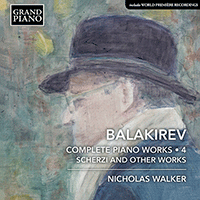
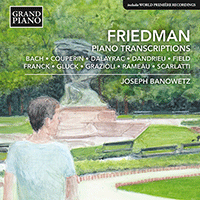
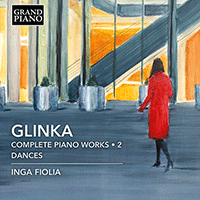
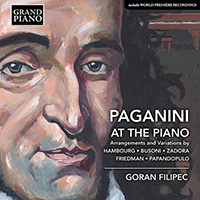
 Grand Piano has gained a reputation for producing high quality recordings of rare keyboard gems. Dedicated to the exploration of undiscovered piano repertoire, the label specialises in complete cycles of piano works by many lesser-known composers, whose output might otherwise have remained unknown and unrecorded.
Grand Piano has gained a reputation for producing high quality recordings of rare keyboard gems. Dedicated to the exploration of undiscovered piano repertoire, the label specialises in complete cycles of piano works by many lesser-known composers, whose output might otherwise have remained unknown and unrecorded.






